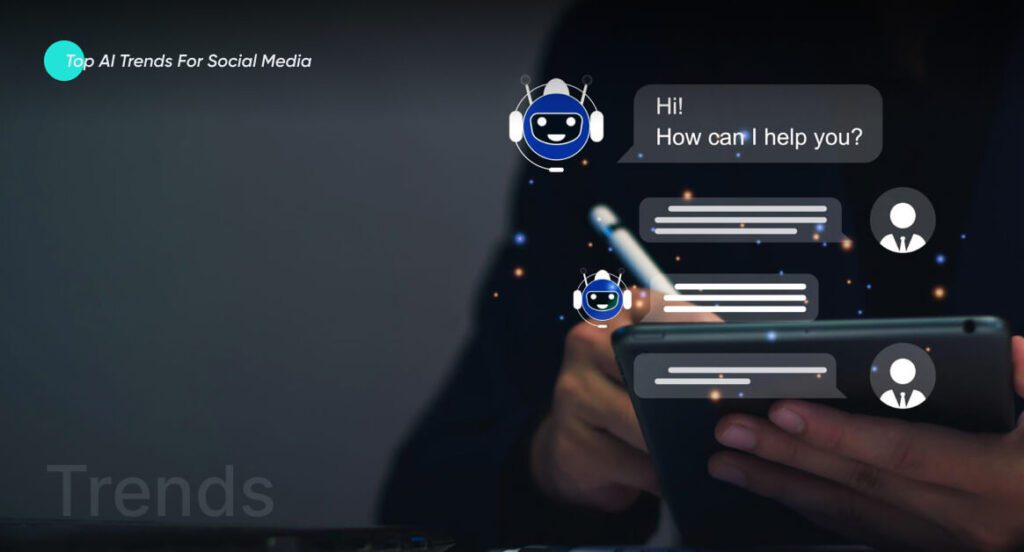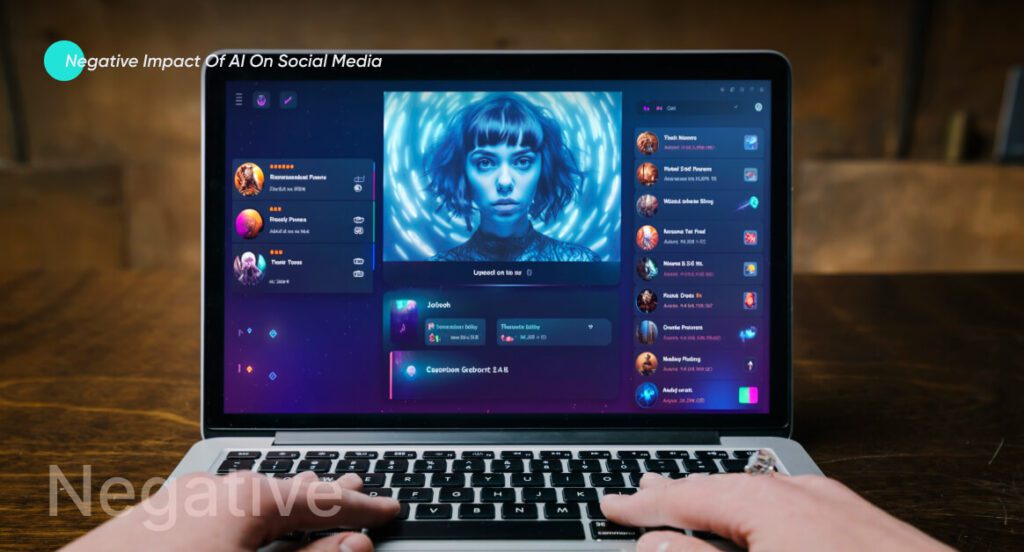The Future of AI In Social Media – Trends, Impact & Best Practices
2024 is going to be the “Year of AI.” With it being integrated into every aspect of our digital lives, it is no surprise that the future of AI in social media is bright.
The journey that started with Six Degrees back in 1997 has now become increasingly AI-influenced with features like sentiment analysis, AI-generated content, and chatbots. AI is truly paving the way to the future of social networking. Here, we will provide an overview of AI trends, their impact, and the best practices for employing them.
What is AI, and its impact on social media?
Artificial Intelligence (AI) is a branch of computer science that has the power to build smart machines that can perform simple and complex tasks that typically require human intelligence. While AI emerged in the early 1950s, it is progressing rapidly.
In social media, AI profoundly impacts how we connect, share information, and interact online. Some ways in which AI impacts social media are listed below:
- AI integration with social media enhances user experience through personalized content recommendations. Sentiment analysis analyzes user behavior, preferences, and interactions to personalize content feed to an individual’s interests. This keeps users engaged and benefits the platform by improving user retention and satisfaction. Moreover, conversion-focused ad-targeting is also being used by businesses to improve revenue.
- AI helps social media platforms remove inappropriate and harmful content quickly. It detects and addresses issues like misinformation, hate speech, and cyberbullying, contributing to a safer and more positive online experience.
- Many social media platforms have AI-powered chatbots and virtual assistants to improve user experience. They provide real-time responses to user queries and provide support.
- Brands use AI for predictive analysis to design content strategies aligned with current market trends to capitalize on social media’s vast user base. With all the technological advancements, the future of AI in social media may also encompass prescriptive analysis.
Hence, AI’s impact on social media is profound. In the next section, we’ll dig deeper into these impacts.
See our latest relevant exploration. How To Create A Social Media App ![]()
Top AI Trends for Social Media Marketing

Sentiment Analysis
AI has transformed how brands perceive customer preferences and create marketing strategies that resonate with the target audience. AI-powered sentiment analysis can analyze social media posts to determine emotions and intentions. This helps brands understand their target audience and tailor marketing campaigns to meet their needs. For example, it can assist them in launching a new product and provide insights into customer preferences, likes, dislikes, and areas for improvement.
AI-powered social media tools can detect brand mentions, alert businesses when they receive negative feedback, and ultimately aid reputation management. Businesses can then proactively respond to customer complaints. For example, when a dissatisfied consumer posts a negative review, the business is alerted in real-time to address the customer complaint and offer a solution. Moreover, AI-powered social listening has also emerged as a lucrative way of understanding consumers.

Sentiment Analysis – Pros and Cons
| Advantages of Sentiment Analysis | Disadvantages of Sentiment Analysis |
| It offers avenues for efficient data processing, especially when designing social media campaigns. | You may achieve more accurate results by utilizing larger datasets, while smaller datasets from social media may give less reliable outcomes. |
| It offers unbiased results and enhanced real-time insight into market dynamics. | It is still an evolving field, and businesses might need to use sense-check and manually correct results sometimes. |
| Consistent measures are used to track sentiments over time, ensuring result reliability. | Social media content often has limited context, thus leading to ambiguity, emotional complexity, and contextual misunderstanding. |
| It aids in brand reputation management by using social listening and algorithms that identify customer feedback. | Sentiment analysis can be used to identify backdoors to manipulate public opinion. |
| It offers more market research opportunities and helps a business enhance marketing strategies. | It offers data privacy concerns for users unwilling to share their data with businesses. |
Content Personalization
AI is making social media more user-friendly and entertaining. It employs content personalization to provide an exceptional user experience. AI-powered algorithms analyze user behavior on the application, and factors like online behavior, content preferences, and interaction patterns provide personalized content suggestions to users. For example, if a user searches for bags, AI algorithms will suggest more related content.
AI-powered advertising enhances social media marketing by targeting demographics, predicting customer behavior, and offering personalized promotions. Thus, ads are more relevant, and conversion rates increase. Content personalization will be an essential component in the future of AI in the social media industry.

AI-Generated Content
AI tools can quickly generate content such as tweets, posts, and articles. This aids in content creation and makes it a smoother process. It also enhances content created by humans by removing human error.
Moreover, with the recent advancements in AI technology, we can now create engaging videos and other visuals. AI design tools are adept at creating on-point visuals that resonate with the target audience and will be essential to social media marketing’s future. These tools are very beneficial for businesses and are quickly emerging to become a necessary component of a business’s marketing and branding strategy.

AI-Powered Chatbots
AI-powered chatbots are being used by businesses to reply to customer queries instantly. They have revolutionized customer support. Chatbots offer customized responses that closely mimic human interaction. Moreover, these chatbots are available 24/7 and can access a customer’s data, including browsing and purchasing behavior and previous conversations.
Moreover, introducing conversational AI has taken the chatbot experience to an entirely new level and increased customer satisfaction and loyalty. Conversational AI uses conversational language to lead more engaging conversations with users. It also helps businesses better understand customer intent, provide personalized recommendations, and answer queries. These features are transforming customer support via social media and have turned it into a revenue-generating channel.

Benefits of AI In Social Media


Generative AI Improves Content Quality
Generative AI enhances the user experience on social media by personalizing content for the target audience. It streamlines the social media process, responds to online inquiries, summarizes complex data, simplifies the content-creating process, and helps create visuals and write copies, product descriptions, web content, and sales pitches. The future of AI in social media indicates it to be a medium of inspiration for content creators.
Pros and Cons of Generative AI
| Advantages of Generative AI | Disadvantages of Generative AI |
| Creates original, new, and engaging content in different domains, leading to innovative content and greater creativity. | The reliability of content produced by generative AI cannot be guaranteed. |
| Automates content creation and saves time and money. | Generative AI could automate jobs to such an extent that it might cause job displacement. |
| It creates personalized content based on individual user preferences and behaviors. | Relying too heavily on generative AI can lead to a decline in human content creation skills. |
| Generative AI creates synthetic data that can be augmented in the real world, and data collection is difficult. | Generative AI can create synthetic content, such as deepfakes. When used to spread misinformation or commit fraud, this can lead to legal and ethical problems. |

Enhances Social Media Ad Management
In the past, brands had to rely on assumptions to create content and messaging that would resonate with their audience. However, data-driven personalization, automation, and experimentation are now possible with AI. AI allows for more accurate audience segmentation based on demographics, geography, interests, behaviors, and psychographics. This, in turn, enables more precise ad targeting. For instance, brands can use Instagram to segment and boost content to those who have interacted with or liked their previous posts. This approach saves time and is effective in reaching a specific niche.
Moreover, businesses can analyze many budgeting and ad-targeting variations with AI tools. They are also adept at testing ads and giving real-time results to understand the impact of a social media campaign. Moreover, the future of social networking will be highly AI-intensive, helping brands figure out the best content to create.

Data Integration and Management
AI simplifies A/B testing by collecting and analyzing data from various sources. It modifies current experiments on the go and eliminates the underperforming elements. Real-time experiences can be improved by targeting different audiences across multiple platforms. Traditional A/B testing is time-consuming, while AI streamlines the process by identifying effective strategies, suggesting optimal actions, and rapidly adding new variants to tests.
Negative Impact of AI On Social Media

Privacy Concerns
Privacy concerns are the biggest risk associated with AI in social media. AI algorithms are designed in a manner where they do user profiling to predict preferences. The future of AI in social media is going to be highly ad-intensive. While AI helps businesses in better ad-targeting, it also raises concerns about the potential misuse of their information.
Content Moderation
AI moderates content on social media to detect fake news and inappropriate content. It has become a blessing in disguise because it may censor legitimate content or fail to detect content that needs to be censored.
Mental Dejection
Constant exposure to personalized content can lead to addictive behavior and negatively impact users’ mental health. This content often leads to excessive screen time, anxiety, and inferiority or superiority complexes.
Algorithmic Bias
AI algorithms use machine learning and are only as good as they are trained. In social media, this can lead to algorithmic bias. It means that AI systems inadvertently might favor one group over another, leading to inequality on the platform.
Manipulation
AI bots are increasingly used to manipulate public opinion, amplify certain content, and spread unrest. This can lead to an unsafe social space and create challenges like we’ve never seen before.
Polarization
Exposure to personalized content tailored to specific user preferences can lead to polarization because users would only be exposed to content that aligns with their belief systems. This ultimately hinders public dialogue.
Misinformation
Fake news and deepfakes are growing concerns for the social media fraternity. AI can generate hyper-realistic fake content, making it challenging to identify what is real.
So, What Do You Think?
We’ve explored the integration of AI and social media in detail; from sentiment analysis to content moderation, we have shared our insights into this evolving landscape.
Now, we want to hear your insights! Tell us your thoughts about the increased reliance on social media and AI. Do you think we can create a balance between the use and misuse of AI, and if so, what will its implications be? Want to know more about the future of AI in social media? Talk to our experts!
Also See our Social App Development Service ![]()
FAQ
In the future, social media platforms will offer immersive and interactive experiences, personalized content, social commerce, and decentralized social media. It will become more integrated into our lives, from education to healthcare, work, and entertainment.
In social media, AI is used for sentiment analysis, content creation and personalization, predictive and prescriptive analysis, AI-powered chatbots, and designing social media marketing strategies.
It is highly unlikely that humans will ever develop a strong emotional connection with AI machines, no matter how well they are programmed to respond to humans. As a result, AI cannot replace humans, particularly as building connections with others is a crucial aspect of business growth.
Masifa is a Content Specialist with a bachelor’s degree in marketing and over three years of experience in content marketing and the IT industry. She is passionate about writing and talking about website and mobile app development, e-commerce, and advancements happening in the IT Industry. She creates engaging and user-centric content to optimize digital experiences for these niches. When she is not creating content, you can find her buried in a good book.